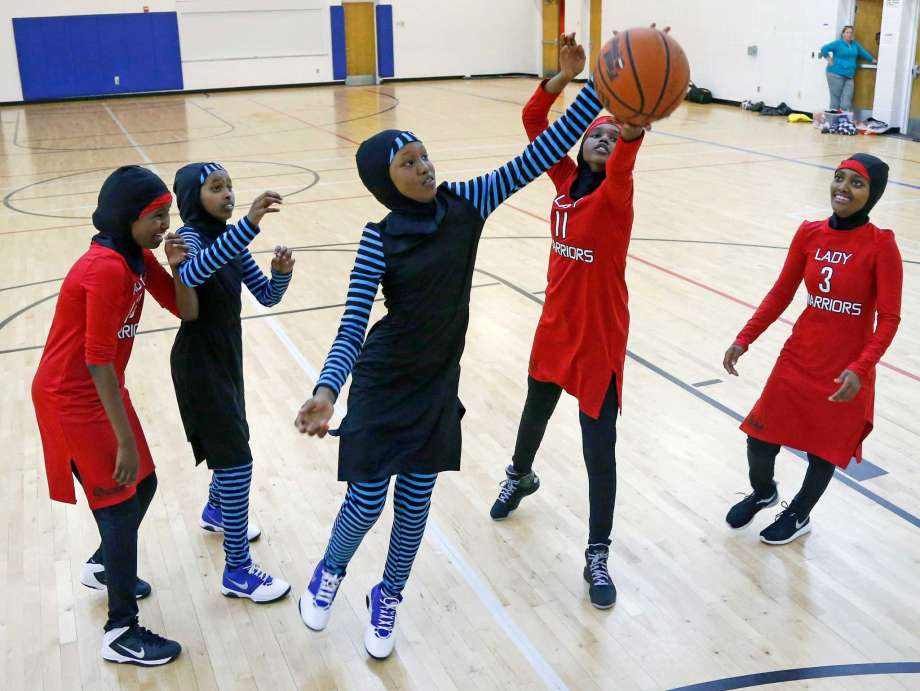
By Brian Mahoney and Doug Feinberg
Associated Press

NEW YORK (AP) — The international group that governs basketball is close to eliminating a longstanding ban on religious headgear in competition, clearing the way for athletes to wear hijabs, turbans and yarmulkes in international competitions.
FIBA told its playing rules committee at a recent meeting to create a proposal that outlines how headgear can be worn safely during games. The goal is to approve the changes at a meeting in May, the organization announced earlier this week.
The move comes following a two-year study and not long after a letter published on social media and sent to FIBA president Horacio Muratore. It called for the end of the rule, and was signed by a dozen WNBA players including Breanna Stewart, tennis greats Billie Jean King and Martina Navratilova, and U.S. Olympic fencer Ibtihaj Muhammad.
“I am a Muslim, and I think anybody should have the right (to wear headgear),” said Nuggets forward Kenneth Faried, who also signed the letter and won a gold medal with the U.S. in the 2014 Basketball World Cup. “Jewish – hey, if you’re Gothic, whatever your religion is – Muslim, Christian, Catholic, it doesn’t matter. You should be able to support your religion and wear whatever is part of your religion.”
The rule banning religious headgear was enacted 20 years ago and wasn’t meant as a ban against any religion, and stood without complaint until recently. Some groups have interpreted the provisions of the rules on uniforms as a ban against the participation of players of certain faiths. According to FIBA, headgear was banned for safety reasons in case it fell off and someone would slip on it or become entangled.
Other sports have already relaxed such regulations.
The International Football Association Board, soccer’s governing body, in 2012 approved headscarves for female Muslim players, reversing a ban that had been enforced since 2007. FIFA, soccer’s governing body, said the following year that men could wear head covers during matches, provided they were the same color as the jersey, had a “professional appearance” and did not “pose any danger.”
“I am against discrimination in all forms and the headgear ban serves to discriminate based on religion and unfairly impacts the participation of women and girls,” Stewart said. “There is no legitimate safety concern, so why have it? Sports should be accessible to everyone and we have the opportunity as a basketball community to lead the way in that effort so we should.”
Athlete Ally – an organization dedicated to end homophobia and transphobia in sports and educate athletic communities to stand up against anti-LGBT discrimination – joined with Shirzanan, a media and advocacy organization for Muslim female athletes, to send the letter to FIBA on Jan. 25, urging leaders to “immediately lift the ban on religious headgear.”
“There’s a growing need of intersectional membership,” Athlete Ally founder Hudson Taylor said. “If there are any groups of people isolated and excluded in sports or otherwise in the sports community, we feel we should support them.”
The committee that will figure out how to change the rule includes U.S. women’s coach Geno Auriemma and NBA vice president of basketball operations Kiki Vandeweghe. Auriemma was in favor of change.
“I know that sports is the one great place where race, religion and ethnicity and politics shouldn’t enter into it, but unfortunately it always does encroach upon it,” Auriemma told The Associated Press. “Anything that encourages participation. Let’s get as many people playing as possible. Make the game as inclusive as possible within reason. You don’t want to put people in a position on the floor where it could cause a problem for the player or the opponent. I’m sure if enough intelligent people get together, they can come up with an intelligent solution to this.”



